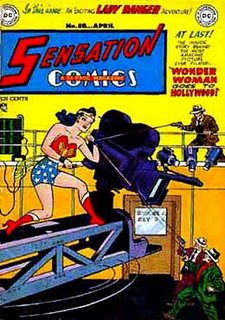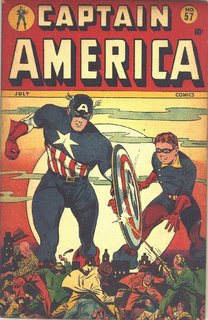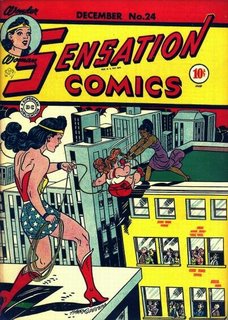 Because I teach a class on the history of sexuality, student groups occasionally ask me to give short talks as part of their programming. Usually I am asked to prove to the administration that their group is more than just a random collective of drinking buddies. That’s cool – I don’t mind creating my own version of the “More You Know” in between keggers.
Because I teach a class on the history of sexuality, student groups occasionally ask me to give short talks as part of their programming. Usually I am asked to prove to the administration that their group is more than just a random collective of drinking buddies. That’s cool – I don’t mind creating my own version of the “More You Know” in between keggers.The other night I presented such a talk to a group of eager students (by eager, I mean this group offered free pizza, thus increasing attendance). In my little blurbs, I usually give an overview of the state of the field. I discuss how historians approach ideas about gender and sexuality as socially constructed ideologies. I end by moving away from the theoretical to the day-to-day consequences of those ideologies today. Usually I make a quick comment about the importance of thinking about how our modern assumptions about race and gender inform current debates about gays and lesbians in the U.S. This time around, though, the Q&A prompted a suggestion about the challenges and tribulations facing the future of the queer community.
One student, in an earnest way, asked “GayProf, isn’t this kinda old fashioned? I mean, most young people [by most, he really meant him] don’t want to be thought of as ‘gay’ or ‘straight’ anymore. They just want to have sex and relationships with whomever they want, free of labels.” It reminds me of a similar flurry of debate that occurred on Joe.My.God around generational and/or political divides within the queer community.
Keep in mind, I am hardly aged. Granted, living in Texas might have added an extra five or ten years to my appearance, but for the most part I actually think of myself as fairly young. For many (not all) queer folk age 25 and less, though, I could just as easily be 131 rather than 31.
Many in the younger generation see those of us who still find utility in organizing around sexual identity as the fossilized remains of the Reagan era. A significant number of younger queer folk feel ambivalent about sexuality as an identity. We hear more and more often that sexuality is just one element of their lives and therefore does not warrant extra attention. They seem torn between a political consciousness that would improve and protect their rights and a desire to break away from the imposition of sexual categories on their daily lives and choices. They also have taken to heart notions taught by academics (like myself) who offer queer theory as a means to destabilize the hetero/homo divide.
 This generation gap, though does not only occur in one direction. Time and time again I hear a constant clamor from “older gay folk” about how easy the younger generation supposedly has it. Believe me, I can fall into this whine myself. After all, it boggles my mind that national chains like Barnes and Noble sell a publication like XY Magazine, which itself is marketed exclusively to young (16-24) queer folk. Though silly and glossy, it’s hard not to see the existence of XY as a type of progress. It’s also understandable to feel a bit cheated that such things didn’t exist and/or didn’t have the national circulation when older queer folk first ventured to have same-sex sex.
This generation gap, though does not only occur in one direction. Time and time again I hear a constant clamor from “older gay folk” about how easy the younger generation supposedly has it. Believe me, I can fall into this whine myself. After all, it boggles my mind that national chains like Barnes and Noble sell a publication like XY Magazine, which itself is marketed exclusively to young (16-24) queer folk. Though silly and glossy, it’s hard not to see the existence of XY as a type of progress. It’s also understandable to feel a bit cheated that such things didn’t exist and/or didn’t have the national circulation when older queer folk first ventured to have same-sex sex.Generational splits constantly reappeared throughout the twentieth century. That's hardly new. Few people would disagree that youth and beauty reign supreme in most gay men’s clubs. That, though, is another entry.
The current identity-generation gap within the queer community appears more serious to me. At the heart of this divide is whether it continues to make sense to claim a shared identity based on our sexual activities. This is a greater divide than the political gap between “liberal” and “conservative.” Queer conservatives might have currency in the mainstream media, but they simply do not represent the majority of queer folk. I also already know queer conservatives won't lift a finger for the collective good. Younger queer folk, however, will be the caretakers of both the movement and also (I hope) our elderly asses when we qualify for Social Security.
Young queer folk feel like they could never identify with a shrill old crone like me who seems to want to play "identity politics." Shrill old crones like me, in contrast, feel bitter that young folk didn’t walk to dance clubs in the snow like we did.
There seems to be a tendency among younger queer folk to reject the notion of a unified community. Likewise, older queer folk feel alienated from the younger generation.
Both sides of the generation gap, however, wrongly presume that the revolution has been won. Each group points to surface appearances as evidence that life is easier now for those who want man-on-man or woman-on-woman sex. Thanks to decades of queer activism, my consciousness about my desires is different than previous generations. I had opportunities to read, hear, and see other queer men. Those younger than me have had even more opportunities. The older generation fails to recognize that having a slightly easier time realizing your desires, though, is not freedom. Likewise, the younger generation seems to confuse sexual experimentation (something every generation has done) with overturning exisitng sexual identities.
Despite our best efforts to historicize and undermine the hetero/homo divide, these divisions still play a fundamental role in organizing our society. It seems premature to declare their death as local, state, and federal governments take an increasing interest in regulating our basic sexual practices. For me, it’s too early to claim victory and too early to abandon a sense of community and shared identity. Though I would love to have the postmodern utopia of perfect sexual freedom come to fruition, we still live a society where sexual desires define our identities.
Though socially constructed, we have a connection through our experiences as queer men and women. Putting sexual identities in historical context allows us to see how others have grappled with same-sex desire in hostile contexts, how they embraced a shared vernacular, and how the organized for group solidarity. The current queer community originates from those struggles. It does not exist free of the historical or contemporary discourse.

I also reject the notion that so-called “identity politics” of the 1960s and 1970s somehow destabilized the political Left in this nation. Acknowledging difference (gender, racial, or sexual) does not automatically connote disunity.
There is nothing shameful or backward about joining a coalition based on shared desires and experiences. Whenever we see two men dining together in a small restaurant or smile knowingly at two women jointly pushing a baby carriage, we connect. We know each other and have a common frame of reference. Regardless of the things that currently divide the queer community, we need to adopt the old union slogan, “An injury to one is an injury to all!”





































